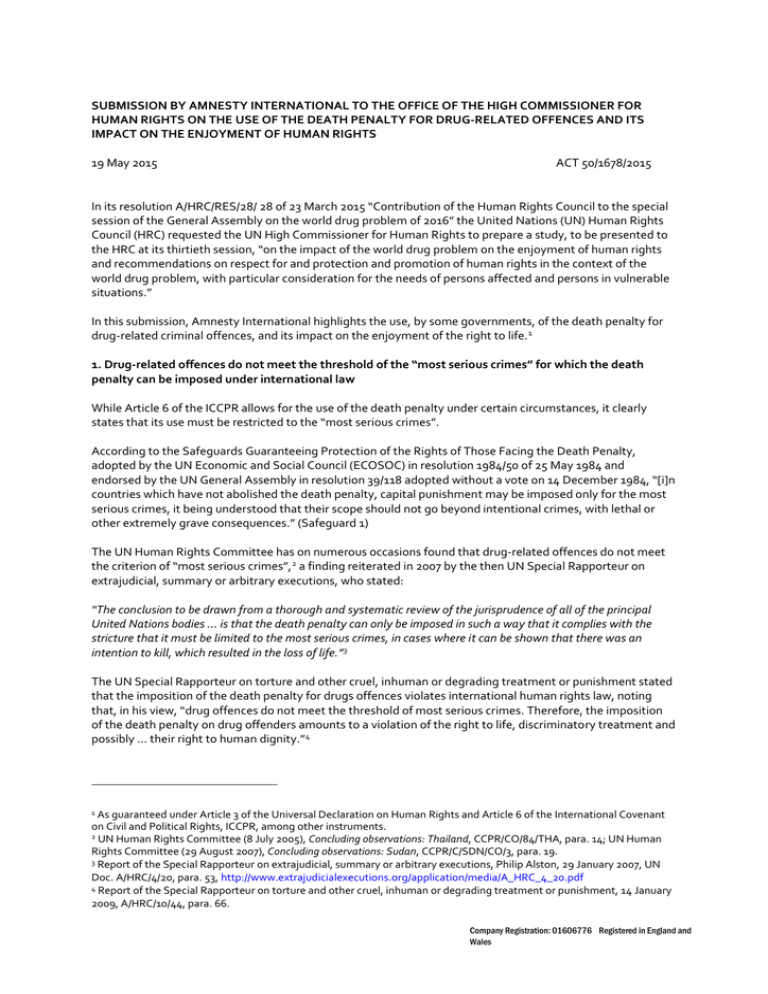SUBMISSION BY AMNESTY INTERNATIONAL TO THE OFFICE OF THE HIGH... HUMAN RIGHTS ON THE USE OF THE DEATH PENALTY FOR...
advertisement

SUBMISSION BY AMNESTY INTERNATIONAL TO THE OFFICE OF THE HIGH COMMISSIONER FOR HUMAN RIGHTS ON THE USE OF THE DEATH PENALTY FOR DRUG-RELATED OFFENCES AND ITS IMPACT ON THE ENJOYMENT OF HUMAN RIGHTS 19 May 2015 ACT 50/1678/2015 In its resolution A/HRC/RES/28/ 28 of 23 March 2015 “Contribution of the Human Rights Council to the special session of the General Assembly on the world drug problem of 2016” the United Nations (UN) Human Rights Council (HRC) requested the UN High Commissioner for Human Rights to prepare a study, to be presented to the HRC at its thirtieth session, “on the impact of the world drug problem on the enjoyment of human rights and recommendations on respect for and protection and promotion of human rights in the context of the world drug problem, with particular consideration for the needs of persons affected and persons in vulnerable situations.” In this submission, Amnesty International highlights the use, by some governments, of the death penalty for drug-related criminal offences, and its impact on the enjoyment of the right to life. 1 1. Drug-related offences do not meet the threshold of the “most serious crimes” for which the death penalty can be imposed under international law While Article 6 of the ICCPR allows for the use of the death penalty under certain circumstances, it clearly states that its use must be restricted to the “most serious crimes”. According to the Safeguards Guaranteeing Protection of the Rights of Those Facing the Death Penalty, adopted by the UN Economic and Social Council (ECOSOC) in resolution 1984/50 of 25 May 1984 and endorsed by the UN General Assembly in resolution 39/118 adopted without a vote on 14 December 1984, “[i]n countries which have not abolished the death penalty, capital punishment may be imposed only for the most serious crimes, it being understood that their scope should not go beyond intentional crimes, with lethal or other extremely grave consequences.” (Safeguard 1) The UN Human Rights Committee has on numerous occasions found that drug-related offences do not meet the criterion of “most serious crimes”, 2 a finding reiterated in 2007 by the then UN Special Rapporteur on extrajudicial, summary or arbitrary executions, who stated: “The conclusion to be drawn from a thorough and systematic review of the jurisprudence of all of the principal United Nations bodies ... is that the death penalty can only be imposed in such a way that it complies with the stricture that it must be limited to the most serious crimes, in cases where it can be shown that there was an intention to kill, which resulted in the loss of life.”3 The UN Special Rapporteur on torture and other cruel, inhuman or degrading treatment or punishment stated that the imposition of the death penalty for drugs offences violates international human rights law, noting that, in his view, “drug offences do not meet the threshold of most serious crimes. Therefore, the imposition of the death penalty on drug offenders amounts to a violation of the right to life, discriminatory treatment and possibly ... their right to human dignity.” 4 1 As guaranteed under Article 3 of the Universal Declaration on Human Rights and Article 6 of the International Covenant on Civil and Political Rights, ICCPR, among other instruments. 2 UN Human Rights Committee (8 July 2005), Concluding observations: Thailand, CCPR/CO/84/THA, para. 14; UN Human Rights Committee (29 August 2007), Concluding observations: Sudan, CCPR/C/SDN/CO/3, para. 19. 3 Report of the Special Rapporteur on extrajudicial, summary or arbitrary executions, Philip Alston, 29 January 2007, UN Doc. A/HRC/4/20, para. 53, http://www.extrajudicialexecutions.org/application/media/A_HRC_4_20.pdf 4 Report of the Special Rapporteur on torture and other cruel, inhuman or degrading treatment or punishment, 14 January 2009, A/HRC/10/44, para. 66. Company Registration: 01606776 Registered in England and Wales This interpretation was most recently upheld by the UN Special Rapporteur on Extrajudicial, summary or arbitrary executions who, in his 2012 report, clarified that “The notion of progressive restriction and the status of Article 6 (2) as an exception suggest that States that wish to use the death penalty must provide a justification for this limitation on the right to life. The outlines of the global picture that can be discerned suggest that there is insufficient consensus to permit the inclusion of crimes other than intentional killing within the exception created for the ‘most serious crimes’”.5 He then concluded that “Domestic law should provide that death sentences may never be mandatory and may be imposed only for those crimes that involve intentional killing. The death penalty may not be imposed for drug-related offences unless they meet this requirement.”6 2. Death penalty for drug-related offences: the global picture Drug-related offences, which can include different charges of drug trafficking and/or drug possession, are punished or punishable by death in Bahrain, Bangladesh, Brunei Darussalam, China, Cuba, Democratic People’s Republic of Korea, Democratic Republic of the Congo, Egypt, India, Indonesia, Iran, Iraq, Jordan, Kuwait, Laos, Libya, Malaysia, Myanmar, Oman, Pakistan, Qatar, Saudi Arabia, Singapore, Republic of Korea, South Sudan, Sri Lanka, Sudan, Syria, Thailand, United Arab Emirates, United States of America, Viet Nam and Yemen.7 Against international law,8 drug-related offences are mandatorily punished by death in Brunei Darussalam, Guyana, Iran, Jordan, Laos, Malaysia, Myanmar, Qatar, Singapore, 9 Sudan, Syria, United Arab Emirates.10 In at least two countries - Brunei Darussalam and Singapore - defendants found in possession of keys to places or vehicles in which drugs are found are presumed guilty of drug possession. This violates the presumption of innocence and fair trial rights.11 3. Death sentences and executions for drug-related offences in 2014 and first five months of 2015 In the report “Death sentences and executions in 2014”, Amnesty International recorded that in 2014 the death penalty was used for drug-related offences in at least 10 countries: China, Indonesia, Iran, Malaysia, Saudi Arabia, Singapore, Sri Lanka, Thailand, United Arab Emirates and Viet Nam: 12 China: in 2009 Amnesty International stopped publishing figures on the use of the death penalty in China. However, the organization has continued to monitor developments and recorded that in 2014, once again, a significant proportion of the death sentences imposed and executions carried out in China involved cases of persons convicted of drug trafficking. 5 Report of the Special Rapporteur on extrajudicial, summary or arbitrary executions, 9 August 2012, A/67/275, para.66. para.122. 7 This list includes different definitions and circumstances of the offence, including drug trafficking resulting into death, drug trafficking not resulting into death, drug trafficking by agents of the state, etc. 8 The UN Human Rights Committee has said that “the automatic and mandatory imposition of the death penalty constitutes an arbitrary deprivation of life, in violation of Article 6, paragraph 1, of the [International] Covenant [on Civil and Political Rights], in circumstances where the death penalty is imposed without any possibility of taking into account the defendant’s personal circumstances or the circumstances of the particular offence”. Pagdayawon Rolando v Philippines, Views of the Human Rights Committee, Communication No. 1110/2002, UN document CCPR/C/82/D/1110/2002, 8 December 2004, para. 5.2. 9 Drug trafficking is presumed if the defendant is found in possession of a certain amount of substances or above. 10 In March 2014 the government of India replaced the mandatory death penalty in the Narcotic Drugs and Psychotropic Substances Act with an optional death sentence. 11 Some discretion has been introduced in Singapore under the Misuse of Drugs Act in 2012, but defendants can still be mandatorily sentenced to death. 12 Amnesty International, Death sentences and executions in 2014 (ACT 50/001/2015), available at https://www.amnesty.org/en/documents/act50/0001/2015/en/Amnesty International reports only on executions, death sentences and other aspects of the use of the death penalty, such as commutations and exonerations, where there is reasonable confirmation. In many countries governments do not publish information on their use of the death penalty, making confirmation of the use challenging. Therefore, with only a few exceptions, Amnesty International’s figures on the use of the death penalty are minimum figures. 6 ibid., 2 Indonesia: on 3 December 2014 Vice-President Jusf Kalla stated that the President would not grant clemency to at least 64 individuals who had been sentenced to death for drug-related offences and that their executions would be carried out (14 executions have since been carried out in 2015). Iran: of the 289 executions that were officially announced in 2014, 122 were for drug-related offences.13 Reliable sources reported at least 454 more executions in addition to those officially announced, of which 222 were for drug-related offences, bringing the total number of drug-related executions to 344. Death sentences for drug-related offences continued to be imposed. Malaysia: information on executions carried out in Malaysia is not publicly available and Amnesty International has not been able to assess whether any were carried out for drug-related offences in 2014. However, the organization recorded that at least 16 death sentences were mandatorily imposed for drug trafficking. Saudi Arabia: in 2014 Amnesty International recorded 42 executions of persons convicted of drug trafficking. Death sentences for drug-related offences continued to be imposed. Singapore: two people were executed after they had been convicted and mandatorily sentenced to death under the Misuse of Drugs Act. Three new death sentences were imposed during 2014; all were mandatory sentences for drug trafficking. Sri Lanka: Amnesty International recorded that at least 10 death sentences were imposed for drug trafficking. Five out of eight people sentenced to death for drug trafficking in the same case were pardoned on 30 October and returned to their country of origin - India. The other three, all Sri Lankan nationals, remained under sentence of death at the end of the year. Thailand: figures released by the Ministry of Justice of Thailand indicated that death sentences continued to be imposed in 2014 for drug trafficking, but Amnesty International was not able to determine their exact number. At the end of the year, 302 people were under sentence of death for drug trafficking, constituting approximately 47% of those on death row in the country. United Arab Emirates: seven of the 25 death sentences recorded in 2014 were imposed for drug-related offences. Viet Nam: at least 60 out of the 72 death sentences that were recorded in 2014 were imposed for drug trafficking. Information on executions is not publicly available. Amnesty International continued to record executions and death sentences for drug-related offences in several countries in 2015. Executions for such crimes are known to have been carried out in China, Iran (241, from official and unofficial sources, as of 28 April 2015), Indonesia (14 as of 15 May 2015) and Saudi Arabia (38 as of 15 May 2015). Amnesty International received reports indicating that death sentences continued to be imposed for drugrelated offences in 2015 in China, Indonesia, Iran, Kuwait, Malaysia, Saudi Arabia, Sri Lanka and Viet Nam. 4. Unfair and discriminatory: the use of the death penalty for drug-related offences Amnesty International has been documenting continued violations of the right to a fair trial and the right not to be subjected to torture or other cruel, inhuman or degrading treatment or punishment in cases where defendants face or have faced the death penalty for drug-related offences. The organization has also highlighted how defendants from economically disadvantaged backgrounds are disproportionately affected by the death penalty, including for drug-related crimes. The following links point to outputs produced by Amnesty International outlining illustrative examples of how these rights have been violated in the context of the world “war on drugs” in Iran, Saudi Arabia and, more recently, Indonesia: Iran: “Addicted to death: Executions for drug offenses in Iran” (MDE 13/090/ 2011), available at: https://www.amnesty.org/en/documents/mde13/090/2011/en/ 13 Reliable sources reported at least 454 more executions in addition to those officially announced. 3 Saudi Arabia: “Affront to Justice: Death Penalty in Saudi Arabia” (MDE 23/27/2008), available at https://www.amnesty.org/en/documents/mde23/027/2008/en/ Saudi Arabia: Urgent Action on behalf of Hajras al-Qurey 21 August 2014 (MDE 23/020/2014), available at https://www.amnesty.org/en/documents/mde23/020/2014/en/ ; he was executed on 22 September 2014. Saudi Arabia: further information on Urgent Action on behalf of Ali Agirdas, 26 November 2014 (MDE 23/034/2014) available at https://www.amnesty.org/en/documents/mde23/034/2014/en/ Indonesia: Indonesia: Further information: Two still at risk of imminent execution, ASA 21/1576/2015, available at: https://www.amnesty.org/en/documents/asa21/1576/2015/en/ Indonesia: Indonesia: Seeking clemency for 10 people facing imminent execution in Indonesia, 26 April 2015, Index number: ASA 21/1537/2015, available at: https://www.amnesty.org/en/documents/asa21/1537/2015/en/ Amnesty International is currently preparing several briefings on the death penalty, including for drug-related offences, to be released in 2015. The organization would be available to share new findings with the Office of the High Commissioner for Human Rights in advance of publication as follow-up to this submission. 5. Recommendations Pending full abolition of the death penalty, Amnesty International urges governments of all countries that retain the death penalty: To establish an official moratorium on executions with a view to abolishing the death penalty, as provided by five resolutions adopted by the UN General Assembly resolutions, including most recently 69/186 of 18 December 2014; To commute without delay all death sentences; To immediately remove all provisions in national law which are in breach of international human rights law, in particular: by abolishing all provisions which provide for death penalty for persons under the age of 18 at the time of their alleged crime, by restricting the imposition of the death penalty to intentional killing, by abolishing all provisions which provide for mandatory death sentences, by prohibiting the imposition of the death penalty against persons with mental or intellectual disabilities, by prohibiting executions of pregnant women and mothers with dependent infants; To ensure rigorous compliance in all death penalty cases with international standards for fair trials, including the rights: to be tried before an independent, impartial and competent tribunal, to competent defence counsel at every stage of the proceedings; to adequate time and facilities to prepare one’s defence, to be presumed innocent until guilt has been proved beyond a reasonable doubt, to appeal to a higher court, and to seek pardon and commutation of sentence; To ratify without reservations the International Covenant on Civil and Political Rights and its Optional Protocols. 4


